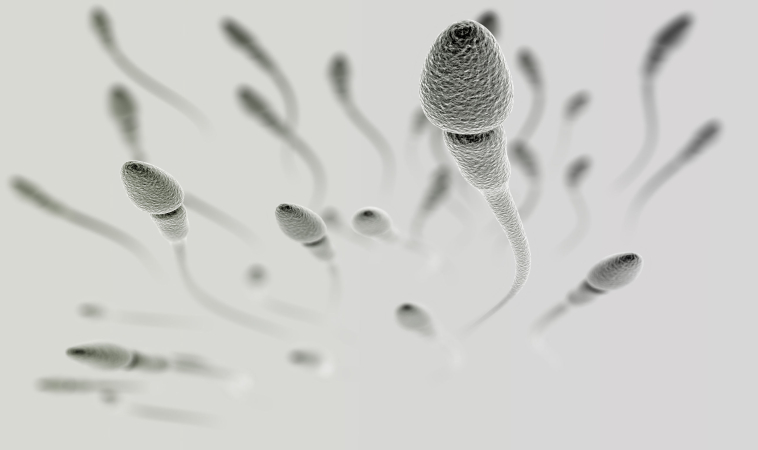A small, but significant study from the Imperial College in London has found that a possible cause of frequent miscarriages could be dysfunction in the sperm of the woman’s partner.1 Recurrent miscarriages are defined as three or more miscarriages occurring before week 20 of pregnancy. One in 50 couples in the UK are affected by recurrent miscarriages. The study was published in the Journal of Clinical Chemistry.
Study looked at the sperm function and quality of 50 men
The study looked at the sperm function and quality of 50 men whose female partners had failed to carry a pregnancy to term and had suffered from at least three miscarriages. The healthy sperm from 60 other volunteers was also analyzed – whose partners had successfully completed pregnancies. Comparing the sperm of the two groups of men revealed that men whose partners were suffering from miscarriage had twice as much damage to their sperm DNA compared to the healthy group.
Doctors traditionally focus on women when looking for causes related to recurrent miscarriage
Lead author Dr Channa Jayasena from the Department of Medicine said, “Traditionally doctors have focused attention on women when looking for the causes of recurrent miscarriage. The men’s health – and the health of their sperm – wasn’t analyzed. For instance, previous research suggests sperm has an important role in the formation of the placenta, which is crucial for oxygen and nutrient supply to the fetus.”
Researchers’ findings
The researchers found that the DNA damage to the sperm was caused by reactive oxygen species – free radicals – inside the semen. Speculation is that these increases in free radical content of the semen could be due to previous infection. However, obesity, or higher male age could also be a factor in the oxidative damage of the sperm.
The average age of men in the two groups differs
A limitation of the study was that the average age of men in the two groups was quite different. For the group with partners suffering from miscarriage the average age was 37 years, whereas the healthy control group had an average age of 30 years. The men in the miscarriage group also were more overweight.
Ongoing infection and previous infections lingering in the prostate gland
Dr Jayasena said in a statement, “Although none of the men in the trial had any ongoing infection it is possible there may be other bacteria from previous infections lingering in the prostate gland, which makes semen. This may lead to permanently high levels of reactive oxygen species. It has taken medicine a long time to realize sperm health has a role to play in miscarriage – and that the cause doesn’t lie solely with women. Now we realise both partners contribute to recurrent miscarriage we can hopefully get a clearer picture of the problem and start to look for ways of ensuring more pregnancies result in a healthy baby.”
Source:
- Jayasena CN, Radia UK, Figueiredo M, et al. Reduced Testicular Steroidogenesis and Increased Semen Oxidative Stress in Male Partners as Novel Markers of Recurrent Miscarriage. Clin Chem. 2019;65(1):161-169.
 Razi Berry is the founder and publisher of the journal Naturopathic Doctor News & Review that has been in print since 2005 and the premier consumer-faced website of naturopathic medicine, NaturalPath. She is the host of The Natural Cancer Prevention Summit and The Heart Revolution-Heal, Empower and Follow Your Heart, and the popular 10 week Sugar Free Summer program. From a near death experience as a young girl that healed her failing heart, to later overcoming infertility and Chronic Fatigue Syndrome and Fibromyalgia through naturopathic medicine, Razi has lived the mind/body healing paradigm. Her projects uniquely capture the tradition and philosophy of naturopathy: The healing power of nature, the vital life force in every living thing and the undeniable role that science and mind/body medicine have in creating health and overcoming dis-ease. Follow Razi on Facebook at Razi Berry and join us at Love is Medicine to explore the convergence of love and health.
Razi Berry is the founder and publisher of the journal Naturopathic Doctor News & Review that has been in print since 2005 and the premier consumer-faced website of naturopathic medicine, NaturalPath. She is the host of The Natural Cancer Prevention Summit and The Heart Revolution-Heal, Empower and Follow Your Heart, and the popular 10 week Sugar Free Summer program. From a near death experience as a young girl that healed her failing heart, to later overcoming infertility and Chronic Fatigue Syndrome and Fibromyalgia through naturopathic medicine, Razi has lived the mind/body healing paradigm. Her projects uniquely capture the tradition and philosophy of naturopathy: The healing power of nature, the vital life force in every living thing and the undeniable role that science and mind/body medicine have in creating health and overcoming dis-ease. Follow Razi on Facebook at Razi Berry and join us at Love is Medicine to explore the convergence of love and health.

















